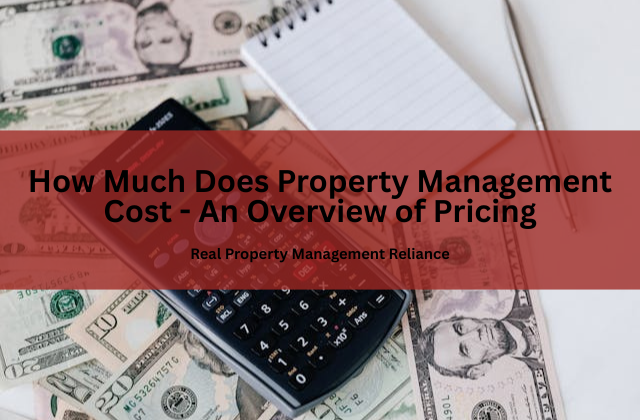Key Takeaways:
Property management fees generally include charges for monthly management, tenant placement, lease renewals, maintenance coordination, and occasional costs like vacancy or eviction fees.
Understanding what each fee covers and asking detailed questions in advance can help landlords avoid unexpected expenses and budget more effectively.
Working with a full-service company like RPM Reliance can save landlords time and stress by handling everything from tenant screening to ongoing property upkeep.
How Much Does Property Management Cost?
Are you thinking about hiring a property manager but unsure about how much it will cost? For many landlords, property management fees can seem confusing and even unpredictable. Whether you own a single rental home or a portfolio of investment properties, understanding what you’re paying for is essential to making informed decisions.
To help you make a well-informed decision, RPM Reliance put together this article outlining common property management fees and what you can expect to pay when seeking property management in Beverly, MA and the surrounding Boston North Shore area.
Common Property Management Fees Explained
Hiring a good property management company can significantly improve your rental business, save time, and reduce stress. However, knowing what you’ll pay, and what you’ll get in return, is key. The cost of professional property management varies based on several factors, including the type of property, location, and services provided.
There are several standard fees property management companies charge. These fees can vary from company to company, but the structure is generally similar. Below is a detailed look at the most common types of property management costs landlords should expect.
Monthly Management Fee
The monthly management fee is the core charge for ongoing management of your rental property. This fee usually covers basic management services such as collecting rent, handling tenant communications, coordinating maintenance and repairs, monthly financial reporting, and enforcing lease terms.
Some companies offer a flat monthly fee especially for single-family homes. It’s important to confirm what services are included in this fee and whether any additional charges might apply.
This is a one-time fee for seeking and placing a new tenant. This fee typically covers advertising the property, showing the property to prospective tenants, the tenant screening process including screening applications, conducting background and credit checks, and preparing and executing the lease agreement It’s important to ask if this fee is charged every time a new tenant is placed, or if it’s waived for lease renewals. Some property managers charge a lease renewal fee or a small percentage of the monthly rent. This fee covers the administrative work involved in negotiating and signing a new lease with an existing tenant. If your property has high tenant retention, this cost can be lower than frequently paying leasing fees for new tenants. Most property management companies will coordinate maintenance and repairs on your behalf, but the costs of those services are left to the landlord. There may also be a maintenance coordination fee for handling the service. Make sure to ask if the company uses in-house maintenance staff or hires third-party vendors. Also, check whether they offer 24/7 emergency maintenance services. Some companies charge a vacancy fee, especially if the property is vacant for a long time. This could be a flat fee or a percentage of the rent. Not all companies charge this, but it’s something to confirm before signing a contract. The setup fee is a one-time charge for onboarding a new client. This fee covers the administrative cost of setting up your property in their system. If a tenant must be evicted, an eviction fee may be charged, separate from further court costs and attorney fees. Make sure to ask if the management company will attend court on your behalf and what services are included in this fee. Some companies offer optional services such as utility management, property inspections, bill pay services, and insurance claim assistance. These add-on services can be valuable for landlords who prefer a more hands-off approach or who manage multiple properties. For example, regular property inspections can help catch maintenance issues early, reducing long-term repair costs. Utility and bill management can ensure timely payments, preventing late fees or service interruptions. If a property suffers damage, assistance with insurance claims can streamline the recovery process and reduce stress. Always review the full fee schedule before signing a management agreement. Transparency is essential, and a clear understanding of optional services will help you choose what’s right for your needs.
Understanding the cost of property management is essential for any landlord considering hiring a professional manager. While the monthly management fee is the most visible charge, there are several other fees you should be aware of, including leasing, maintenance coordination, and potential vacancy fees. Knowing what these property management costs are and what services they cover will help you plan your rental income and expenses more accurately. RPM Reliance offers transparent, full-service property management for landlords looking to maximize returns without sacrificing peace of mind. Our team handles everything from tenant placement to maintenance coordination, ensuring your investment is protected and your time is respected. Contact RPM Reliance today to request a free consultation and see how we can help simplify property management for you.
Tenant Placement or Leasing Fee
Lease Renewal Fee
Maintenance and Repair Costs
Vacancy Fee
Setup Fee
Eviction Fee
Additional Services
Bottom Line
We are pledged to the letter and spirit of U.S. policy for the achievement of equal housing opportunity throughout the Nation. See Equal Housing Opportunity Statement for more information.






